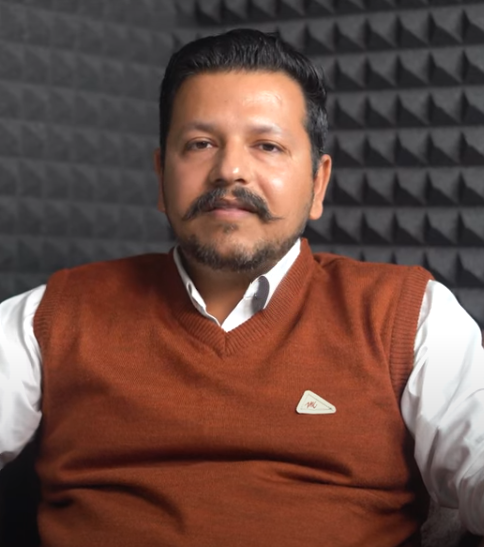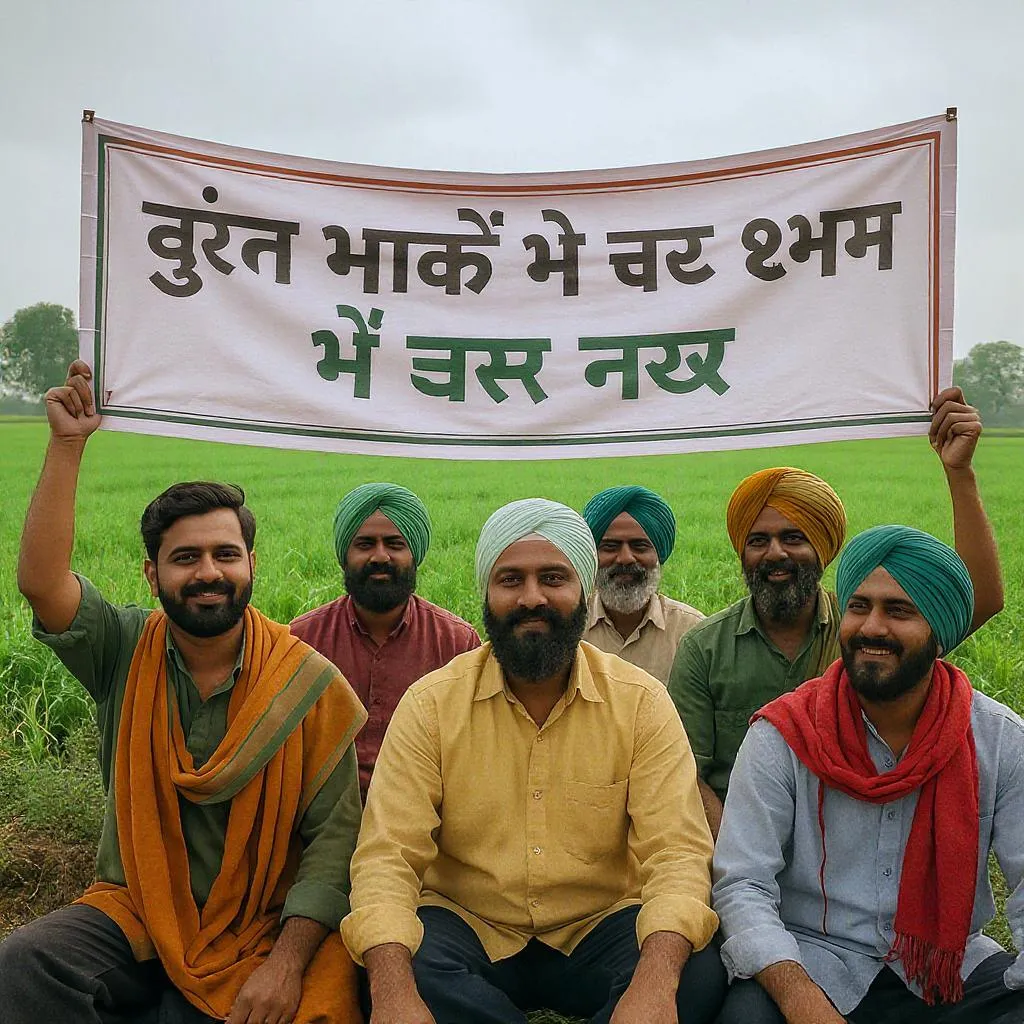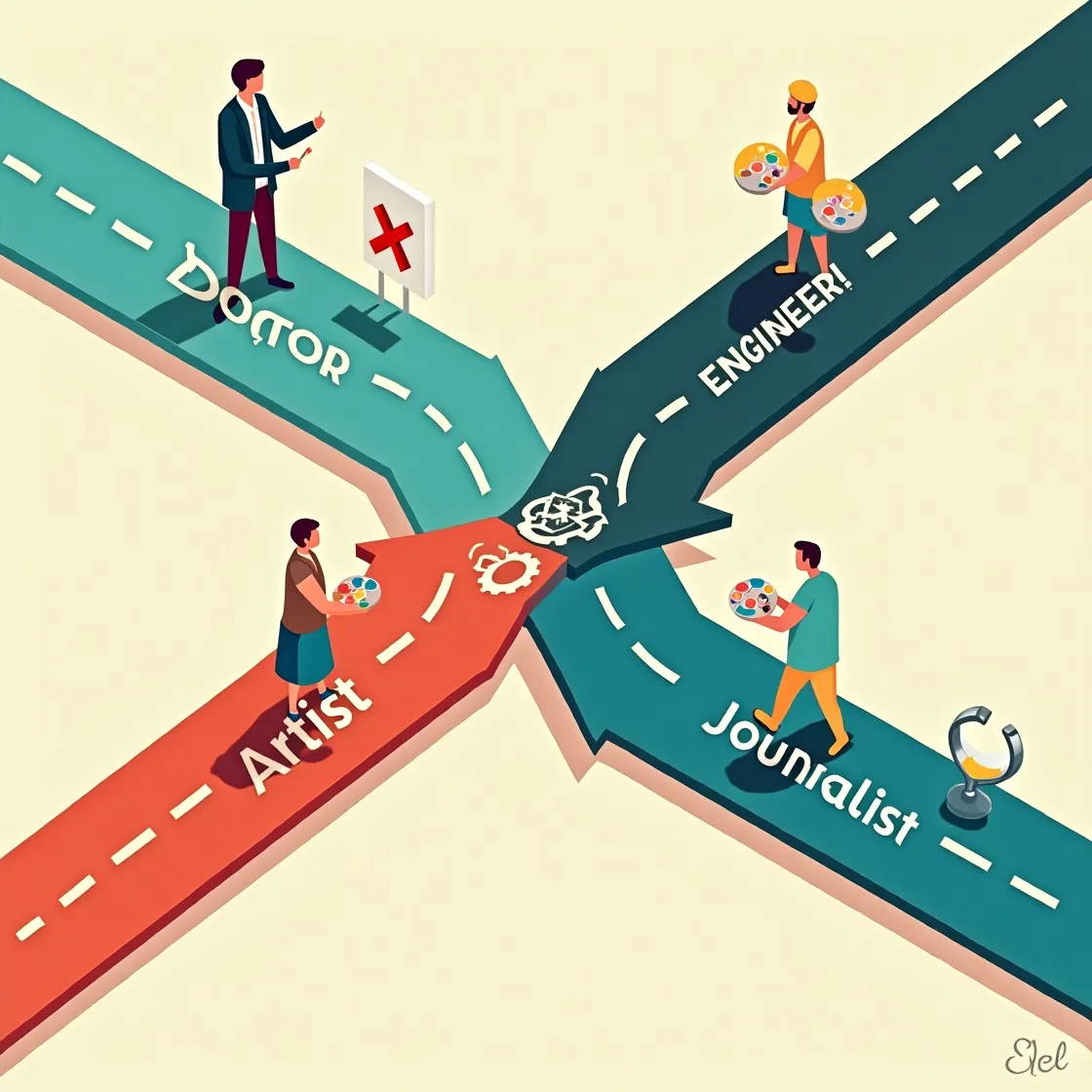🎙️ Punjabi Podcast with Navneet Sharma: Farmer Protest & Adani Secrets
 Ex-Professor & Government Advisor Dr. Navneet Sharma on TechCast Punjabi
Podcast
Ex-Professor & Government Advisor Dr. Navneet Sharma on TechCast Punjabi
Podcast
🎓 Dr. Navneet Sharma: What They Don’t Teach You About Education, AI & Career Choices
Dr. Navneet Sharma, former professor at Punjab and Chandigarh University and advisor to ministers in Haryana, brings years of academic and administrative expertise to this insightful episode.
He unveils what most won’t tell you about the new-age education system, AI-driven changes, and how students and professionals can navigate evolving career paths in today's competitive world.
This conversation is a must-watch for students, educators, and anyone curious about the future of education and work in India.
🚜 Farmer Protest & Adani Secrets Revealed by Dr. Navneet Sharma | AI Has Reduced Children's Mental Capacity

Farmers' protest in Punjab - A key topic in our Punjabi podcast
In this exclusive Punjabi podcast interview, Dr. Navneet Sharma discusses the truth behind the farmer protests, Adani's influence, and how AI is disrupting education and jobs in India. A must-watch for students, educators, and politically aware citizens.
🎯 Key Takeaways from This Punjabi podcast:
- 💡 AI Impact: Learn how artificial intelligence is reshaping education and career paths
- 🎓 Career Guidance: Expert advice on choosing the right career in today's digital age
- 🌍 Study Abroad: Real insights about international education opportunities
- 💰 FIRE Movement: Understanding the Financial Independence, Retire Early trend
- 📱 Digital Skills: Essential skills needed to thrive in the AI era
- 🎙️ Media Careers: Opportunities in Mass Communication and podcasting
- 🧠 Future-Ready: Strategies to stay relevant in a rapidly changing job market
Is AI Helping or Hurting Students?

The impact of AI on education - A critical discussion in our Punjabi podcast
Until a few years ago, students relied on teachers, textbooks, and discussion groups to truly understand a topic. Today, answers are just one prompt away. Tools like ChatGPT, Bard, and Perplexity give instant answers—but something essential is being lost in the process.
Dr. Navneet Sharma observes a striking shift: "Students now enter classrooms already armed with AI-generated content. But they've stopped asking 'why' or 'how.' They know the answers, but not the questions."
During a recent college project review, a group submitted a perfect, beautifully formatted research paper. But when asked to explain one paragraph, they went blank. It had been generated entirely by AI—and they hadn't read it themselves.
💡 Key Insight: "AI is like a calculator. Great for solving problems—but dangerous if you forget how to count."
Dr. Sharma isn't anti-AI. In fact, he encourages its smart use. But he warns that using AI to bypass learning is like outsourcing your own brain. He believes students must be trained to use AI as an assistant, not a replacement.
📉 What's Broken in Our Education System?
Dr. Navneet Sharma doesn't sugarcoat the truth. According to him, the cracks in India's education system run deep—especially in states like Punjab.
In rural areas, government schools are collapsing, suffering from poor infrastructure, outdated curricula, and absentee teaching staff.
Meanwhile, private schools overcharge parents but continue to underpay and undervalue teachers, crushing their motivation to teach beyond the textbook.
Perhaps most concerning: career counseling is almost non-existent after 12th grade. Students are left confused, directionless, or pushed into courses they have no interest in—simply because it's a trend.
A growing number of students are blindly applying to study abroad, chasing vague dreams of "a better life" with no understanding of the financial, legal, and emotional complexities involved.
💡 Key Insight: "A child's psyche and passion are more important than grades or package dreams." – Dr. Sharma
For Dr. Sharma, the solution starts with realigning priorities: listening to students, understanding their strengths, and creating guidance systems that go beyond marksheets.
🌍 Is Going Abroad Still Worth It?

Study abroad realities - Expert insights from our Punjabi podcast
For decades, studying or working abroad—especially in countries like Canada, the UK, or Australia—was considered a golden ticket to success. But Dr. Navneet Sharma says the narrative is rapidly shifting.
Students are investing ₹20–30 lakhs for overseas education without fully understanding the ground realities. Many end up with survival jobs, visa challenges, or homesickness they weren't prepared for.
"Canada is no longer a dreamland," he says. "People are coming back. The job market is saturated, taxes are high, and AI is replacing even basic customer service roles."
That doesn't mean going abroad is wrong—it just means it should be a well-researched decision, not a social trend. According to Dr. Sharma, students should:
- Build strong foundational skills first
- Choose practical courses with job relevance
- Understand post-study work rights and local job market rules
- Have a clear Plan B
💡 Key Insight: "Going abroad is not a status symbol—it's a strategy. Make it wisely."
Dr. Sharma encourages students to explore opportunities in India first—through internships, vocational training, and digital freelancing—before seeking international exposure.
🎓 How Should Students Choose a Career Today?

Career guidance strategies discussed in our Punjabi podcast
In this Punjabi podcast, Dr. Navneet Sharma shares valuable insights about career choices in an age where students are overwhelmed by choices—and often influenced by trends, peer pressure, or social media. He lays out a simple, powerful framework for choosing the right career.
According to him, the process should start with self-awareness, not social expectations. Choosing the right career begins with asking three important questions:
- What is the student naturally drawn to?
- What are they genuinely good at?
- Can that skill or passion be turned into a sustainable career?
Unfortunately, most students are either chasing high-paying jobs they don't enjoy or enrolling in trendy degrees with no real scope.
Dr. Sharma advises parents and mentors to observe the child's true interests early on. "Let a chef become a chef. Let a designer become a designer. Don't push a coder into law or an artist into engineering."
💡 Key Insight: "Passion without planning is a hobby. Planning without passion is a job. The right career blends both."
His suggestion: combine skill-based courses, internships, and real-world exposure in school and college so students get to test what they actually enjoy—before committing years to a wrong path.
🎯 What is the Impact of AI on Jobs?
In this episode of our Punjabi podcast, Dr. Navneet Sharma discusses how AI is not the future—it's the present. According to him, artificial intelligence has already begun reshaping industries across the globe. From programming to logistics, the impact is deep and irreversible.
"Programming jobs are already being automated. Self-driving trucks are replacing traditional drivers. Even customer service roles are being taken over by bots." These shifts are especially challenging for Indian youth who traditionally sought work abroad in such roles.
The fear is not misplaced—but it's also not the full picture. Dr. Sharma believes that while some jobs will disappear, many new ones will emerge—especially for those who adapt and upskill.
💡 Key Insight: "Only the multi-skilled will survive. The future belongs to those who can think, create, and communicate effectively."
He emphasizes that today's employers no longer want to hire four different people for writing, editing, photography, and communication. They want one person who can do it all.
That's why Dr. Sharma encourages students to master three modern career tools:
- 🧠 Content Creation
- 🎥 Video editing
- 🗣️ Public Speaking
These skills are not just for influencers—they're essential across education, business, media, and even tech. With AI doing the mechanical work, human creativity, clarity, and emotional intelligence become priceless.
🔁 FIRE Trend: What's That?
In this Punjabi podcast episode, Dr. Navneet Sharma explains how in the hustle-driven world of 9-to-5s, a bold new trend is quietly taking root—FIRE, short for Financial Independence, Retire Early. And as he explains, it's not just a buzzword—it's a complete shift in how young professionals are viewing money and time.
With rising job stress and burnout, people in their 20s and 30s are asking a powerful question: "What if I don't want to work until 60?" The FIRE movement says—you don't have to.
Instead, individuals are:
- Starting financial planning in their early 20s
- Investing in mutual funds, SIPs, and digital assets
- Creating multiple income streams
- Minimizing unnecessary spending
Once they reach a stable passive income—often by their 30s or 40s—they voluntarily quit their jobs to focus on passion projects, travel, or quality family time.
💡 Key Insight: "FIRE is not about quitting work—it's about quitting what drains you. It's freedom by design, not by age."
Dr. Sharma believes FIRE will shape the next generation of India's workforce. The message is clear: Don't just earn—earn smart, plan smarter, and live fully.
🧾 What's the Right Way to Use AI in Education?
Dr. Navneet Sharma believes AI can be a force multiplier—if used wisely. "It's not about banning ChatGPT or Bard. It's about building digital discipline."
Instead of spoon-feeding answers, students should use AI to explore deeper questions, summarize complex topics, and simulate interviews or mock tests. Teachers can use it to prepare lesson plans, decode student queries faster, and offer personalized learning.
💡 Key Insight: "AI should support curiosity, not suppress it. Use it like a mentor, not a crutch."
He warns against total dependence: "If your entire assignment or SOP is AI-written, you're learning nothing. AI can be your calculator, not your conscience."
The best outcomes happen when students learn to prompt well, verify sources, and reflect on what AI gives them—rather than copy-pasting blindly.
🎙️ Mass Communication : Still a Smart Career?

Behind the scenes of a professional Punjabi podcast recording
In this Punjabi podcast discussion, Dr. Navneet Sharma explains how with an explosion of digital platforms, media roles are no longer limited to just newspapers or TV. According to him, Mass Communication is not only relevant—but more diverse and opportunity-rich than ever before.
He categorizes the media ecosystem into six distinct verticals:
- 📰 Print Media – Reporting, editing, sub-editing, magazine features
- 📻 Radio – RJ, production, content curation
- 📺 Television – Anchoring, direction, newsroom management
- 📱 Digital & Social Media – Content strategy, video scripting, page management
- 🎞️ Film & Documentaries – Scriptwriting, camera, editing
- 🧠 Communication Strategy – PR, brand storytelling, digital marketing
Earlier, experience sometimes outweighed degrees. But today, a professional degree is non-negotiable. "Without a proper Mass Communication degree, no media house will even shortlist your resume," Dr. Sharma asserts.
💡 Key Insight: "Mass Comm isn't just about writing news. It's about managing the information blast of our era."
He recommends institutions like Panjab University, Chitkara University, and Chandigarh University—all of which offer media programs with industry-integrated teaching, hands-on tools, and guest faculty from the professional world.
For students after 12th, options include:
- 🎓 BA in Journalism & Mass Communication
- 💻 Short-term digital media certifications (3–6 months)
- 📈 Courses in Public Relations, Event Management, or Advertising
In today's info-overloaded world, communicators are as critical as coders. Whether on YouTube, TV, or Instagram—people who can create, edit, and communicate clearly are in demand.
🎯 Final Thoughts from Dr. Navneet Sharma
In this concluding segment of our Punjabi podcast, Dr. Navneet Sharma leaves students, parents, and educators with a grounded message: "Career clarity is more important than career comparison."
He urges families to stop forcing decisions based on what relatives or neighbors are doing. "Don't chase careers for package. Chase what matches your child's personality, curiosity, and natural energy."
Today's world rewards authenticity and depth. Whether someone becomes a digital artist, a chef, a researcher, or a media strategist—success lies in alignment, not imitation.
💡 Key Insight: "Passion fuels excellence. If your work excites you, it will elevate you—and the country."
He encourages every student to take time, explore deeply, and not fear career pivots. "It's not the first job or the first degree that defines you—it's how well you grow with change."
In the era of AI, FIRE, and information overload, the only career strategy that works is one built on clarity, consistency, and courage.
🧩 Conclusion
Dr. Navneet Sharma’s discussion brings rare clarity to how AI, education, and social change intersect in Punjab and beyond. TechCast Punjabi continues inspiring young minds to think critically and adapt fearlessly.
📩 Want to Connect with Gurinder Singh Dhanoa?
If you're interested in legal research, career guidance, or educational consulting, you can reach out to him professionally.
Email Here Book now!- A student confused about what career path to take after school or college?
- A parent seeking clarity on your child's future in the age of AI?
- An educator or institute wanting expert guidance on adapting to future-ready education?